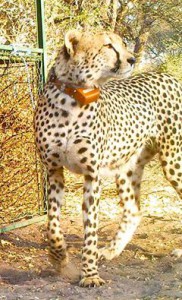
The fact that his body was discovered on the side of the highway, along with the shotgun cartridge indicates that Legolas was opportunistically killed and was unlikely to be causing a direct threat to livestock. CCB staff are devastated by this news. We at CCB have always sympathised with the farmers who have problems with predators, but this unprovoked attack is really unnecessary. Considering the declining populations of cheetahs in Africa, the death of any cheetah is concerning, but the loss of such an iconic, record-breaking cheetah who contributed so much to the knowledge of this species, is truly devastating.
Because he was killed on public land, shot in an area devoid of livestock and his body abandoned rather than delivered to wildlife authorities as required, this killing qualifies as a poaching case and is being investigated accordingly. Our entire team and those who were lucky enough to have worked and studied this magnificent animal are all in mourning in the wake of this needless attack. Of the seven cheetahs that were collared in the research project last July, three have been confirmed to have been shot (43%). Considering that the number of cheetahs being shot is likely to be much higher than reported, the rates of off-take are of great concern. Legolas’s death has been heartbreaking for the CCB team, but it has also reinforced our need to continue to fight to save this threatened species. Clearly there is still a lot of work that needs to be done.

 RSS Feed
RSS Feed
